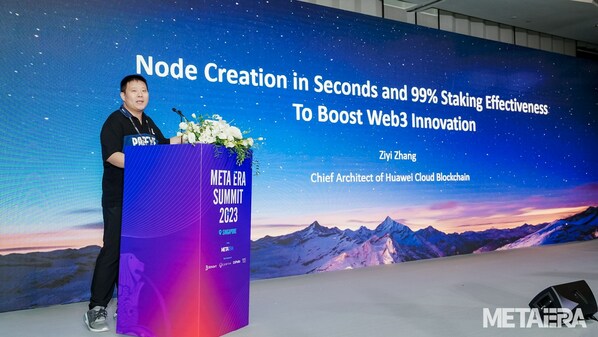SINGAPORE, Sept. 13, 2023 /PRNewswire/ -- From September 11 to 12, Huawei Cloud showcased staking node engine, confidential computing, and ZK rollup at Token2049 in Singapore. In this event, Huawei Cloud discussed the future of the Web3 industry with top vendors, builders, and developers, and stated its commitment to accelerating Web3 innovation with technical breakthroughs.
Node Creation in Seconds, 99% Staking Effectiveness: A New Engine for Web3
Web3 is in the early stage of development and faces many technical challenges regarding performance and security of transactions on chains. On September 12, in the MetaEra Summit, Zhang Ziyi, Chief Architect of Huawei Cloud Blockchain, introduced Huawei Cloud's Ethereum staking node hosting service. With innovative algorithms, this service achieves up to 99% staking effectiveness and higher rewards. QingTian Enclave security framework supports environment and identity authentication and full-link data encryption and decryption. With this security framework, applications and data can run secured on Huawei Cloud Elastic Cloud Servers (ECSs). In addition, Huawei Cloud accelerates ZK rollup hardware innovation. With Huawei-developed XPU, architecture innovation, and algorithm optimization, the average confirmation time of ZK rollup transactions plummeted from hours to minutes.
Huawei Cloud QingTian Enclave Safeguards Transactions
Security has been significant to Web3. Currently, Web3 wallet applications still face severe security challenges when it comes to the storage and attack defense of wallet private keys. Blockchain Security Alliance Meetup, initiated by the Blockchain Security Alliance, is one of the major activities of Token2049 and has become the focus of the global blockchain security and Web3 ecosystem. Jia Xiaoqiang, Director of Huawei Cloud Virtualization Products, introduced Huawei Cloud's confidential computing solution and Web3 solution aiming to secure systems, applications, and sensitive data in wallet scenarios.
Jia Xiaoqiang said, "Huawei Cloud QingTian Enclave confidential computing solution is just like a safe for wallet private keys. It supports environment and identity authentication and full-link data encryption and decryption. Applications and data can be run with protection on Huawei Cloud Elastic Cloud Servers (ECSs). Unauthorized users and third parties are isolated to maintain transaction security of private keys and wallets." Huawei Cloud is committed to building a highly secure and available solution for Web3, and all the efforts turned into QingTian Enclave, an end-to-end solution securing the execution environment for applications and sensitive data through software and hardware.
IPFS Cloud Data Ecosystem with Tenfold Rewards
Decentralized storage is another key infrastructure of Web3. However, the industry shares the same headaches in migrating data to the cloud, reducing costs, and improving effectiveness. At the Fil Dev Summit on September 12, Bai Tao, Chief Cloud Storage Solution Architect of Huawei Cloud, shared InterPlanetary File System (IPFS) data service and elastic cloud deployment solution jointly developed by Huawei Cloud and partners. Huawei Cloud's cloud data entry simplifies the process of storing data on IPFS, resulting in a 10-fold increase in data rewards and reduced data storage overhead for enterprises. Additionally, Huawei Cloud's large-ratio EC technologies enable 91% effective capacity usage of disks and scalable storage for data up to 10 EB-level. With the elastic cloud deployment solution, users can choose offline encapsulation, cloud verification, or end-to-end cloud deployment. Huawei Cloud, with over 18 years of experience in enterprise-level storage, aims to deliver cloud storage services that are not only cost-effective but also highly efficient.
Providing "Everything as a Service", Huawei Cloud aims to offer robust infrastructure that enables advanced, distributed computing power for Web3. This commitment extends to building an open, efficient, and secure blockchain platform that can foster innovation in the Web3 ecosystem.












